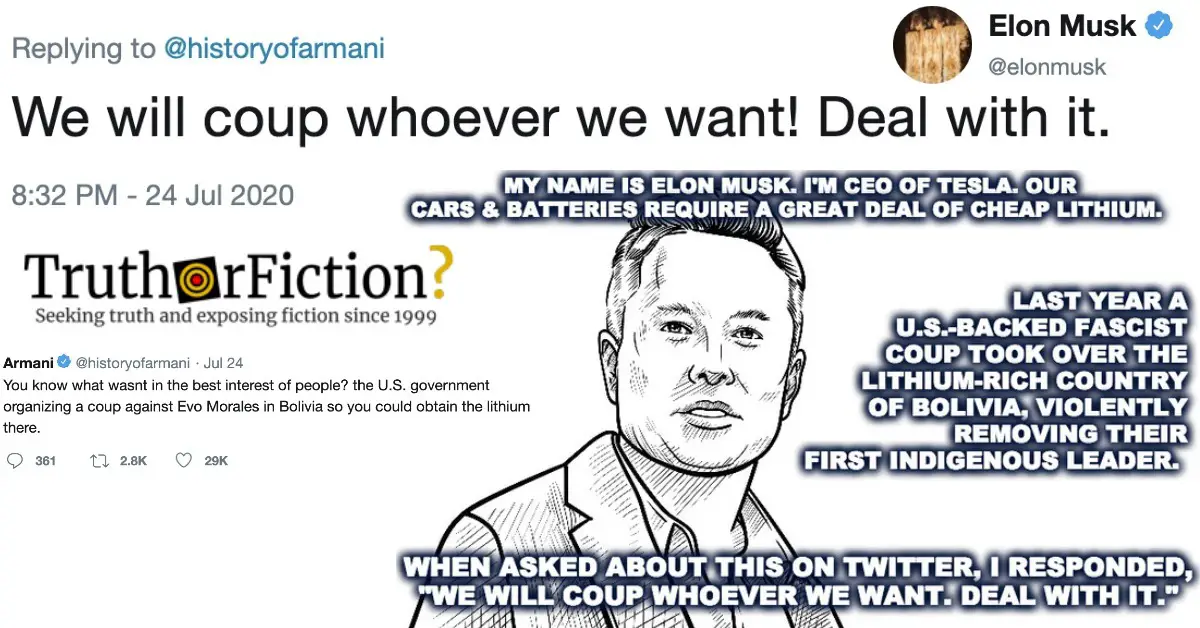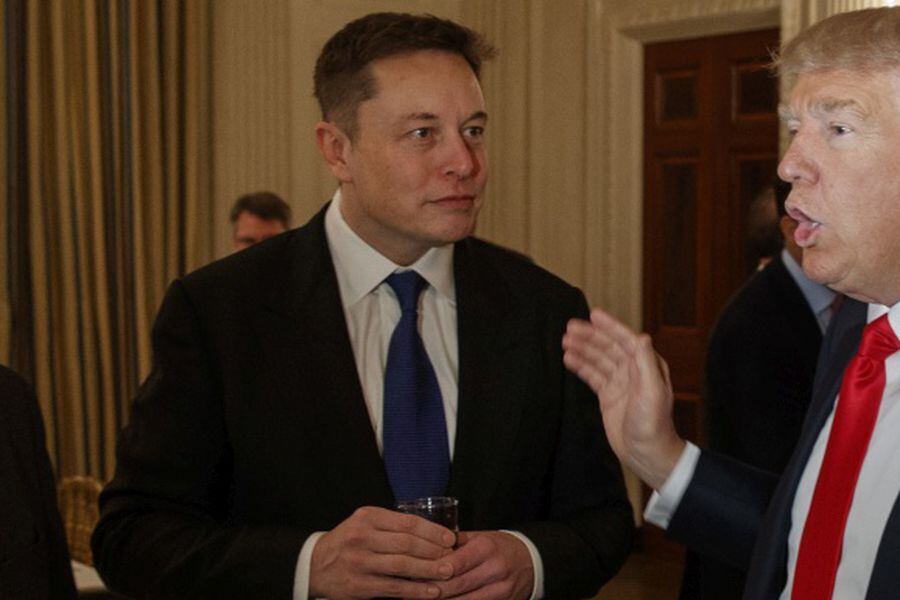
United Tesla Company: Widespread Condemnation of Elon Musk’s Bolivia Coup Comments
Alan Macleod / Mint Press
(July 27, 2020) — Multibillionaire Tesla Motors CEO Elon Musk once again proved that he does not know how to keep silent. After being challenged on Twitter about his alleged involvement in the overthrow of the democratically elected government of Evo Morales in Bolivia last November, Musk responded, “We will coup whoever we want! Deal with it.”
Although he later deleted his statement, he doubled down on his stance, tweeting “Congratulations to the people of Bolivia!” on Morales’ ouster.
The pushback to Musk’s apparent confession that he was intimately involved in the violent overthrow of a foreign government and its replacement with a far-right dictatorship was swift. “I’ve been silently fuming about this ever since he tweeted it. It just chokes me up with so much rage I can’t think of anything to say about it. I write for a living and I am still completely without words for this,” wrote independent journalist Caitlin Johnstone.
“All oligarchies are composed of trash, but there does seem to be something special about this one,” said writer Justin Podur. Assistant editor of The Grayzone Ben Norton agreed, tweeting, “The fascist Bolivian coup dictatorship has already invited billionaire imperialist Elon Musk to exploit the country’s lithium reserves. When this capitalist oligarch brags, ‘We will coup whoever we want,’ take the fascist criminal at his word.”
The Guatemala coup engineered by the US is replayed in Bolivia, with Tesla playing the role of United Fruit — destroying democracy for cheaper batteries and bananas.
Paulo Drinot, summed up the event, describing it as the “United Tesla Company.” Drinot, a Professor of Latin American History at University College, London, is referencing the 1954 Guatemalan coup d’etat, where the United Fruit Company, now known as Chiquita, conspired with the US government to overthrow President Jacobo Arbenz, chiefly because the popular leader had initiated land reform that was hurting the company’s bottom line, ensuring the country would return to being nothing more than a banana republic.
Musk’s comments seemed to confirm what many had been saying since the coup took place. Barely 24 hours after the events, Indian academic and writer Vijay Prashad wrote that they “cannot be understood without a glance at the nation’s massive reserves of this crucial mineral.” Morales himself labeled his ouster a “lithium coup d’etat” last year. The former president, who was forced to flee to Argentina or face a lifetime in prison, said that Musk’s words were “more proof that the coup was due to Bolivian lithium; and two massacres as a balance. We will always defend our resources!”
Musk’s company, Tesla, relies on lithium batteries for its electric vehicles. Bolivia is right in the center of the Lithium Triangle” — a region high in the Andes mountain range where over half of the world’s known deposits of the metal lie. With the world beginning to transition away from fossil fuels, the need for energy storage devices is expected to grow exponentially.
Morales, a resource nationalist, had for a long time seen lithium as the way forward to industrialize and improve the country’s economy, hoping to keep the technology and profits from battery generation inside Bolivia. Musk’s plans to open a car plant in Brazil and use cheap Bolivian lithium had hit a snag with the defiant president refusing to give him a sweetheart deal. Morales’ successor, the military-backed Jeanine Añez, immediately began privatizing the country’s key resources, and there is widespread speculation that such a deal is imminent after Añez’s running mate in the now-suspended 2020 elections asked Musk to build a factory inside the country.
This is the third time that the far-right Añez administration has postponed the elections due to concerns over the coronavirus, leading many to speculate that no election is forthcoming, particularly because Morales’ Movement to Socialism Party is way ahead in the polls.
Morales was elected Bolivia’s president in 2005. A popular and stabilizing force in the often volatile nations, his programs managed to reduce poverty by half and extreme poverty by three quarters, increasing the (inflation-adjusted) per capita GDP by 50 percent in his 13 years in office. Unlike rulers that had come before him, he came from the country’s indigenous majority and was previously a poor farmer and leader of a peasant’s union. He managed to turn the country around primarily through nationalizing its key resources and using the profits to fund social programs.
He was among the most vocal critics of US imperialism in the world and, together with Venezuela’s Hugo Chavez and Brazil’s Lula da Silva was one of the key leaders of Latin America’s so-called “Pink Tide,” a continent-wide movement aimed at countering imperialism worldwide.
While the South African billionaire’s words certainly appear damning, he has a long history of making inflammatory statements and trolling others online, which cast some doubt on what he said. In May, he tweeted that Tesla’s stock price was “too high” in his opinion, leading to an instant reduction of over $80 per share in value. He also called Vern Unsworth, a British diver rescuing Thai boys trapped in a cave a “pedo,” after he brushed off Musk’s supposed attempts to help as a useless “P.R. stunt.”
For someone so closely connected to the notorious Jeffrey Epstein, it is perhaps not best practice to call other people pedophiles. Musk has been photographed alongside Epstein’s partner Ghislaine Maxwell, and reportedly gave him a private tour of his California SpaceX facility. Epstein also reportedly set Musk’s brother up with his girlfriend.
While the Tesla billionaire’s latest comments are certainly incriminating, it is unlikely that there will be any legal ramifications, as the United States continues to be in full support of the coup. Like with the Epstein case, there are precious few ways to hold the powerful to account if the US government is not interested in pursuing the matter.

Donald Trump meets with Tesla CEO Elon Musk in the White on Feb. 3, 2017. (Evan Vucci | AP)
Alan MacLeod is a Staff Writer for MintPress News. After completing his PhD in 2017 he published two books: Bad News From Venezuela: Twenty Years of Fake News and Misreporting and Propaganda in the Information Age: Still Manufacturing Consent. He has also contributed to Fairness and Accuracy in Reporting, The Guardian, Salon, The Grayzone, Jacobin Magazine, Common Dreams the American Herald Tribune and The Canary.
Posted in accordance with Title 17, Section 107, US Code, for noncommercial, educational purposes.

The US-Supported Coup in Bolivia Continues to Produce Repression and Tyranny, While Revealing How US Media Propaganda Works
Glenn Greenwald / The Intercept
(July 23 2020) — The US supported military coup in Bolivia has largely disappeared from western news outlets ever since the November 2019 massacres of pro-democracy protesters by the right-wing faction that seized power. But for Bolivians, the repression and tyranny that replaced their stable and thriving democracy endures.
And, predictably, the “interim president” installed after the coup, Jeanine Áñez, continues to rule the country 10 months later, despite no possibility of being democratically elected, while she and her party plot how to prevent an election which all polls show will result in victory for the socialist party of toppled President Evo Morales.
What makes the coup in Bolivia and its aftermath so worthwhile to explore is not just the inherent importance of Bolivia itself: a country of 11 million people with a rich and unique ethnic, cultural and religious diversity, as well as an ample supply of the now-vital resource of lithium.
Bolivia is the latest in a long line of thriving democracies destroyed as US institutions cheer and lend support.
It is also instructive because of how US discourse evolved in support of the coup, with supposed “foreign policy experts” across the political spectrum — The Atlantic’s Yascha Mounk, Mother Jones’ Editor-in-Chief Clara Jeffery, former Obama official and Stanford Professor Michael McFaul, along with the Economist, the New York Times, and the Washington Post — spouting outright falsehoods to depict the destruction of Bolivian democracy as the salvation of it.
Since the coup last October, many of the key claims used to justify the ousting of Morales — most particularly claims by the Organization of American States that the election resulting in Morales’s victory was fraudulent — have been proven to have been lies.
Yet not a single one of the foreign policy “experts” or media outlets have acknowledged their errors or even addressed these subsequent revelations, because they know that there are never any consequences for journalists and analysts as long as they remain subservient to the US government agenda (while the New York Times reported on the studies proving the OAS claims to be baseless, they never acknowledged that their own reporting and editorializing treated those claims as true).
Bolivia is but the latest of a long line of thriving, stable democracies destroyed with the support if not the outright participation of the US government, while jingoistic media figures disseminated the propaganda used to justify it all. And the suffering, violence, repression and tyranny left in its wake are then simply ignored by those who helped bring it about.
Today’s SYSTEM UPDATE, which debuts at 2:00 pm ET on The Intercept’s YouTube channel, explores all of these issues, provides an update on post-coup Bolivia, and dissects the key role played by propaganda from US political and media venues. I’m joined by two of the most knowledgeable specialists on Bolivia: Kathryn Ledebur, director of the Andean Information Network, who has lived and worked with coca farmers in Bolivia for the last 30 years, and Mark Weisbrot, co-director of the Center for Economic & Policy Research, the first group to debunk the OAS claims of election fraud. For so many reasons, Bolivia matters, not just to people in the region but also in the US
MintPress News is licensed under a Creative Commons Attribution-NonCommercial-ShareAlike 3.0 International License.
For more on Bolivia’s coup and the propaganda campaign surrounding it, see:
• The New York Times Admits Key Falsehoods that Drove the Coup
• The OAS, the US and the Coup against Bolivia’s Evo Morales
• The US-supported Coup in Bolivia Continues to Produce Repression and Tyranny
• Bolivia’s US-backed Coup Government Suspends Elections for Third Time